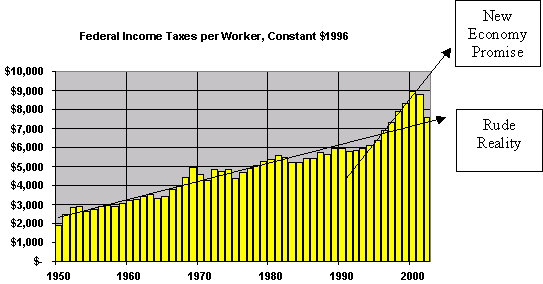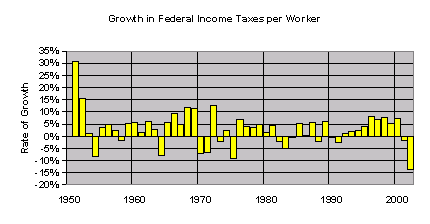|
 |
Dealing with the State Budget Crisis
More Taxes or Less Spending?
|

|
By Edward Leamer
Professor of Management, Economics and Statistics
Director, UCLA/Anderson Forecast
January 29, 2003
|
Avoid rapid reductions in spending
The economy is able to absorb slow and predictable changes in spending but rapid, and
substantial reductions in spending by business, consumers or government is what causes
economic downturns and rising unemployment. Both Federal and State tax policies should
be designed to prevent or at least to limit any sharp reductions in spending by consumers
or business. And both Federal and State governments should avoid sharp spending reductions
of their own, especially when the economy is otherwise fragile. When spending reductions
are put into place, they should occur at a point in time and over a long enough time frame
for businesses and consumers to take up the slack. Otherwise, plan on weak economic growth
and rising joblessness.
The risks ahead come from consumers and state governments
Looking forward there are two sources of risk for substantial reductions in spending that
could cause another dip and increased joblessness. Overstimulated consumers in the last two
years have bought cars and homes at unsustainable rates, and when interest rates elevate again
there is sure to be dramatic softening of these two important sectors of the economy. We don’t
expect that the Federal Reserve Board will risk a rate increase any time soon, but on the other
hand, each month makes the problem of too many cars and too many new homes greater and greater.
The other risk is much more imminent – tax shortfalls in virtually every state in the country are
forcing states to make a difficult choice between higher taxes and spending cuts. This is a big
problem for the year ahead since the economy is in a very fragile condition with timid and tentative
spending plans by business and consumers. The way that state budget crises are handled may determine
the health of the economy in the next year. So which is better: less spending or more taxes?
State spending is an important source of economic growth.
This is a very important question. State and local spending has added about 0.4% to the total growth
in US real GDP of around 3%. If spending levels were maintained in real terms (increasing spending by
about 2%), that 0.4% contribution to GDP growth would turn to zero, thus reducing US GDP growth to the
level of 2.6%, which is sure to come with rising unemployment unless some other component of spending
takes up the slack. Consumers and businesses could and would take up the slack if given enough time,
but one year is nowhere near enough. Worse still would be what seems inevitable – a reduction in
spending by state and local government – possibly directly reducing GDP by a full 1% in the year ahead
and more because of multiplier effects.
The link between taxes and consumer spending is weak and elastic
Reduced spending by state and local government is a clear threat to the health of the economy, but tax
increases are a problem too, aren’t they? No, not too much. Not in the short run. Of course it is
true that tax increases cause spending reductions by the affected taxpayers, but if history is a guide,
these spending reductions are so gradual that they are hardly noticed. Except for those families that
are living from paycheck to paycheck, a tax reduction is going to find its way into bank accounts, and
leave our current spending largely unaffected. Except for those families that are living from paycheck
to paycheck, a tax increase is going to come from savings accounts, and leave current spending largely
unaffected.
Because of the long and uncertain delays from proposal of a tax reduction to approval to implementation
to consumer spending, Federal and State tax policy should not be aimed at the short run stimulus issues
but instead should target long run issues like productivity, investment and saving, where the effect is
clear. Leave the short-run stimulus to Mr. Greenspan and the Federal Reserve, who can quickly and
effectively encourage sales of homes and cars with low interest rates.
Therefore lean strongly toward tax increases, right now.
Because of the sharp differences between the effects of spending cuts and tax increases on total spending,
now is the time to lean strongly toward tax increases. Now is also the time to put more of the tax burden
on those with discretionary income whose personal spending will not be substantially affected by a tax
increase. Further, for the same reason, in the choice between spending cuts that affect spending levels
but not employment levels, versus those that directly affect employment levels, lean strongly toward the
spending cuts that don’t affect employment levels. For the economy overall, the one sure way to get a
sharp reduction in consumer spending is to put people out of work. It isn’t going to do anyone any good
to have unemployed school teachers and unemployed police and unemployed nurses, not to mention economists.
That’s for now. In a year or two, when the economy is less fragile, we need a different kind of State
budget, a budget that maintains and improves California’s competitiveness. In particular, tax rates on
businesses and wealthy taxpayers cannot be permanently out of line with other states without seriously
harming job prospects for all of us. Thus increases this year need to be explicitly temporary.
How did we get in this trouble?
We need to deal effectively with the state budget crisis this year, but we also need to prevent this from
happening again. It isn’t difficult to see where the problem comes from: There was exceptional revenue
growth in the later half of the 1990s. That by itself is not the problem. The problem was buying into
the New Economy hype and thinking that the Good Fairy of the New Economy had permanently changed all the
rules, providing us with exceptional growth, low unemployment and low inflation for ever and ever.
Businesses were the first to become “disenchanted” with this fairy tale, and cut back spending on
information technology in 2000. State governments are scheduled for the disenchantment process this
year, forced to adjust to disappointing reductions in tax revenues. Consumers are still in Never-Never
land, and spending future income that will never come.
The figures below show the steady increase in Federal Personal Income Taxes per Employee in constant $1996
over the last fifty years, starting at $2000 per worker in 1950 and elevating because of economic growth to
$6000 by the mid 1990s. But from 1995 to 2000 the personal income tax skyrocketed to $9000 per worker.
Didn’t anyone stop to ask if this was a sustainable increase in taxes? After all, we’ve been there before.
In the late 1960s the same combination of strong economic growth and a strong stock market contributed to a
rapid increase in the personal income tax, but that was followed by two bad years, 1970 and 1971, and the tax
per worker didn’t return to its 1969 level until almost a decade later in 1978. It is very likely that it
will take a decade to return the Federal income tax per worker to its level in 2000. In the meantime expect
a growing Federal deficit and hard times for states that must balance their budgets.

Conservative Planning
Faced with the ups and downs of tax revenues, states should opt for conservative planning, meaning that
decisions should be made to limit the chance of undesirable outcomes. For example, most businesses reckon
that having a customer go away unhappy because of a stock outage is much worse than having some merchandise
left over. They accordingly overstock and usually have merchandise left over. We do the same thing when
we put money in the parking meter. We reckon that it is worse to have the meter run out than to leave a
quarter or two unused when we pull out of the parking spot. Thus most of us put a little extra in the meter.
The state should also adopt conservative planning. But which is worse: Having the state government make
commitments it cannot live up to, or leaving tax revenue unspent at the end of the year? For most politicians,
it’s a great disaster to have tax revenue unspent. For Republicans, that’s an opportunity for a tax cut.
For Democrats, that’s an opportunity for more social spending. For the voters, however, the larger problem
is having the State make commitments that are difficult to live up to. Like the mess we are in right now.
Because politicians have different incentives on this issue than do voters, we need to put in place conservative
budgeting rules that align the budgeting process with the voters’ interests, and thus minimize the risk of
making commitments that cannot be lived up to.
It isn’t hard to formulate a conservative budgeting rule. One possibility would be to tie next year’s budget
plans to this year’s revenue. This is what most of us wisely do with our personal budgeting – we don’t commit
to spend our salary increases until they actually occur.  This would work rather well for the State budget.
Real Federal personal income tax fell in only 15 of the last 52 years. A budget premised on no increase in
personal income tax absent an increase in tax rates would thus have involved spending commitments that were
hard to live up to in only 28% of the years. To have avoided almost all the problems in the last 50 years, we
could have budgeted to 90% of last year’s personal income taxes. That very conservative rule would have dealt
with every downturn, except the one we are in right now. But we are not likely to have another 100 year flood
any time soon. This would work rather well for the State budget.
Real Federal personal income tax fell in only 15 of the last 52 years. A budget premised on no increase in
personal income tax absent an increase in tax rates would thus have involved spending commitments that were
hard to live up to in only 28% of the years. To have avoided almost all the problems in the last 50 years, we
could have budgeted to 90% of last year’s personal income taxes. That very conservative rule would have dealt
with every downturn, except the one we are in right now. But we are not likely to have another 100 year flood
any time soon.
|
Download the full article in PDF
|
|
|

